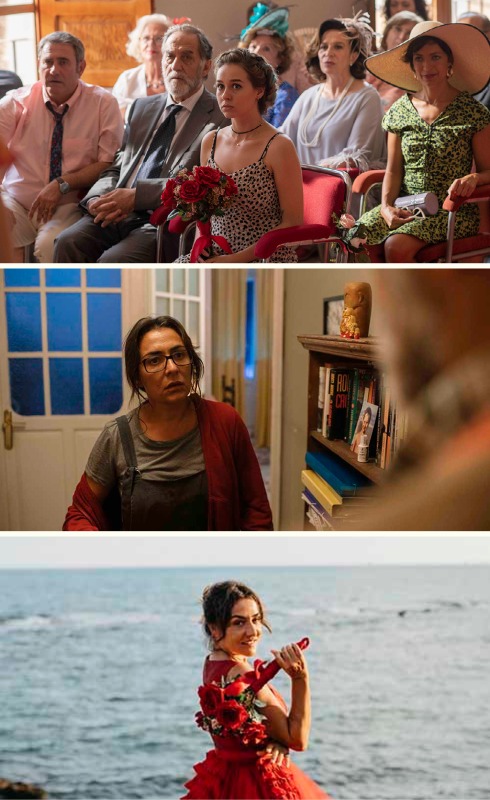 LA BODA DE ROSA (Rosa’s Wedding). Starring: Candela Pena, Ramon Barea, Sergi Lopez, Nathalie Poza, Paula Usero, Xavo Gimenez, and Paloma Vidal. Directed by Iciar Bollain. Rated M (Coarse language). 99 min.
LA BODA DE ROSA (Rosa’s Wedding). Starring: Candela Pena, Ramon Barea, Sergi Lopez, Nathalie Poza, Paula Usero, Xavo Gimenez, and Paloma Vidal. Directed by Iciar Bollain. Rated M (Coarse language). 99 min.
In the 2021 Goya Awards, this subtitled Spanish comedy was nominated for Best Film, Best Director, Best Screenplay, Best Actress, Best supporting Actress, and Best Original Song. In Spain’s Feroz Awards, it was judged Best Comedy Film of the year. It tells the story of a woman who breaks away from her selfless support of others to announce her desire to marry.
Rosa (Candela Pena) is 45 years of age and works for a film production company in Valencia in its wardrobe department, as an overworked costume designer for the company’s movies. Her life is spent giving selflessly to others, including members of her dysfunctional family.
Rosa has a demanding father, Antonio (Barea), who, years after his wife’s death, wants to move in with her. She also has an anxious sister, Violeta (Poza), who fears she will lose her job and takes to alcohol to cope with the stress. Rosa has a divorced brother, Armando (Lopez), who leans on her for help and advice, as his marriage crumbles around him – she puts his children to bed, while his wife, Marga (Vidal) prefers to be absent. She also has responsibilities for her own daughter, Lidia (Usero) – Rosa helps to care for Lidia’s twins, allowing Lidia’s husband to avoid any involvement with them. In addition, Rosa meets heavy demands placed on her by friends and neighbours.
Tired of all the requests being placed on her, and at breaking point, Rosa makes the decision to return to her childhood home in Benicassim on the Spanish coast, leaving everything, and everyone, behind. She decides that she will marry again, and announces her engagement. Everyone assumes it is to her boyfriend, Rafa (Gimenez), but that is not so.
Much to the confusion of everyone, Rosa announces that she is marrying ‘herself’. She expresses a desire to start her own business, using her late mother’s dress shop in the town that she returns to. The comedy-drama becomes life-affirming, and full of messages about the value of independence and female empowerment. But it also has an edge that offers a comic tone that is satirical. Rosa wants a wedding, where she promises ‘herself’ respect and happiness.
This is a feel-good film with bite, and its owes much of its strength to the film’s female Spanish director, Bollain, who explores comedy scenarios with a deft touch. Bollain directs a film that is genuinely funny, but it is one that is also reflective about the ills that characterise her targets, including Spanish society. The film passes comment on society’s attitude to immigrants, for example, and such issues benefit greatly from her perspective. Under Bollain’s direction, potentially tragic features go hand in hand with comic ones. Violeta, for instance, comically shows insight into her drinking problem, but she goes on drinking. And Armando is humorously likeable, but unable to cope with a marriage that he knows is falling apart. A lot of comic moments in the film have pain associated with them, and this makes them closer to real life.
The acting is impressive. Pena effectively captures the transformation of Rosa from a person, who is entirely captive to other people’s expectancies, to a woman who courageously asserts her independence. Poza is impressive as Violeta; Rosa’s concerned sister with underlying vulnerability.
The film brings subtlety and finesse to understanding people. As Rosa’s deception picks up pace, and chaos descends, the movie becomes a joyous celebration of family togetherness.
Palace Films
Released 22 June 2021
Peter W Sheehan is an Associate of Jesuit media